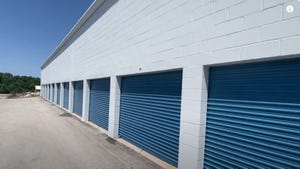From the outside looking into our industry, the process of developing and managing a self-storage business looks simple. But today, it’s anything but. If you’re considering the purchase of an established facility or building a new complex, having a qualified third-party firm perform a feasibility study has never been more critical.
January 14, 2016

By Jackie and Jim Chiswell
In 2015, 15 million to 18 million square feet of self-storage space (give or take a few million) was shipped from metal-building suppliers for new projects and facility expansions. While that’s probably not a record-setter, it still marks the biggest jump in industry construction in almost a decade, and the pipeline for 2016 could be just as strong.
From the outside looking into our industry, the process of developing and managing a self-storage business looks simple. But today, it’s anything but, especially with community regulations, zoning requirements and the highly competitive climate. If you’re considering the purchase of an established facility or building a new complex, having a qualified third-party firm perform a feasibility study has never been more critical. An objective study is important because, all too often, people without a self-storage background miss critical pieces of information that could mean the difference between failure and success.
What the Study Should Include
A feasibility study should provide you with insight to answer to a whole range of questions. It should include:
A review of the characteristics of the proposed site. Visibility is still critical to future success, however, I’ve seen people build on dead-end streets with no drive-by traffic and still be successful because theirs was the only properly zone land in an underserved market.
An understanding of the market you’ll be serving. Many times a detailed demographic report reveals hidden pluses or minuses about an area.
An examination of the quantity and quality of established facilities with which you’ll be competing for market share. Today’s customers are demanding convenience, security and good customer service. Many current facilities are older with deferred maintenance and no onsite management. First-generation sites can sometimes be eliminated as competition altogether.
A possible layout of the project and the resulting potential unit mix, along with recommendations on phasing the project and development-cost assumptions.
Lease-up assumptions and pro forma results projected out at least five years.
If you’re buying an existing facility, the study should include:
A unit-by-unit analysis of the rent roll
A statement on the reasonableness of current facility expenses
An analysis of the current customer profile
An understanding of existing maintenance issues
A review of operational upside potential
An examination of the competition
The results of the study should provide you with a clear understanding of the facility’s future financial performance. You can make it look pretty, but the value of a self-storage business has always been the net operating income it produces. Finally, the feasibility or acquisition due-diligence study should reveal a recommendation to move forward or a negative outcome on the potential site or purchase.
What If You Get a Red Light?
What if the recommendation is negative? While investigating self-storage sites nationwide, my research often reveals a fatal flaw or series of problems that makes a location infeasible. The potential owner then says something like, “Can’t the rental rates be forecasted higher? Don’t you think it will lease up quicker? I know I can build it for a lot less than you projected!” My absolute favorite is, “But I already own the land, so doesn’t that make it feasible?”
When I’m working with someone to determine the feasibility of an acquisition or development, I always ask myself, would I invest my own money in the project? If all the research I’ve developed leads me to answer in the negative, I encourage the client to walk away. A professional shouldn’t be engaged to tell you what you want to hear but to honestly assist you in determining whether the investment is viable.
Choosing a Professional
Many lenders familiar with self-storage require that a feasibility study or acquisition due-diligence report be prepared by a qualified third-party firm. How do you go about finding and choosing the right professional? While some bankers will provide you a referral list of consultants, in many cases, you’re on your own.
When making your decision, consider a variety of factors. Make sure the person or firm has a depth of self-storage experience. Review the current literature, such articles on insideselfstorage.com, to gauge the involvement the person has in the industry. Finally, ask other folks in the business for their recommendations. You could post a message on selfstoragetalk.com, for example, or attend a state or national conference and listen to the various speakers. However, the No. 1 factor is to engage someone with whom you feel a positive chemistry during your discussions.
In an industry that, in many parts of the country, is running at 90 percent-plus occupancy, and with positive economic data flowing from the storage real estate investment trusts, the temptation to rush forward and jump in with both feet is real. However, just like you learned at Boy Scouts, Girl Scouts or summer camp, you should always investigate the right place to enter the water.
Rate of Return
A feasibility study can’t provide you the answer to one of the most important decisions you need to make in building or buying: What rate of return are you willing to accept? If after everything is calculated, you plug in the operating results for the business and the indicated rate of return is 14 percent when you wanted 20 percent, you have your answer. For you, since the development doesn’t meet the desired return, the project isn’t feasible. For someone with lower expectations, it could be a green light. I urge you to consider the rate-of-return question throughout the entire development or acquisition process.
Exit Strategy
Another important question to answer is, “What’s your exit strategy?” That may seem like a strange question to be considering at the beginning of this process, but the answer will take you down totally different paths.
If the answer is that your self-storage business is a long-term investment that will be held by the family, you’ll make different decisions about spending that extra $1 or $2 per square foot for upscale security or office amenities. If your goal is to simply build it and flip it, you should start the selling process from the beginning. Evaluating your exit strategy and making sure it’s realistic is a critical component to overall success.
Other Considerations
Please don’t forget about facility management and marketing. Building anything in America has become increasingly difficult over the past 20 years. It’s very easy to get caught up in all the drama brought on by shifting government regulations and barriers to development. However, you must be working on a parallel track—that is, while you’re buying or building, you must also be thinking about how you’re going to market and manage the business. Remember, it’s only when you start renting units that you starting making money. So please make sure you’re planning for the day the facility office door opens for the first time.
After my 31 years working in this industry, I still consider self-storage to be one of the best entrepreneurial business opportunities across the United States and around the world. An objective feasibility study will help you make smart decisions from the very start.
Jim Chiswell, aka "The Storage Coach," is an industry veteran and owner of Chiswell & Associates LLC. Since 1990, his firm has provided feasibility studies, acquisition due diligence and customized manager training for the self-storage industry. He’s a frequent speaker at the Inside Self-Storage World Expo and various association events. His wife, Jackie, has been his editor for more than 40 years. To reach him, call 434.589.4446; e-mail [email protected]; visit www.selfstorageconsulting.com.
You May Also Like





